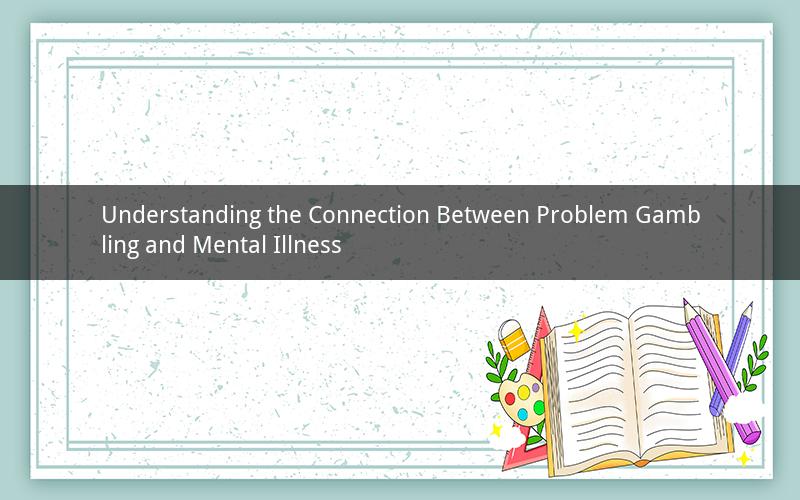
Introduction:
Problem gambling has been a topic of extensive research and debate over the years. With the rise of online gambling and the availability of various forms of gambling, the prevalence of problem gambling has increased significantly. One of the most frequently asked questions in this context is whether problem gambling is a mental illness. This article aims to explore the relationship between problem gambling and mental illness, highlighting the signs, causes, and treatment options.
1. Defining Problem Gambling:
Problem gambling, also known as gambling disorder, is characterized by persistent and uncontrollable gambling behavior that leads to significant harm or distress. It involves a wide range of negative consequences, including financial, social, and psychological problems. While some individuals may enjoy gambling without any issues, problem gambling becomes a problem when it starts to interfere with daily life.
1.1 Signs and Symptoms:
Identifying problem gambling can be challenging, as it often goes unnoticed or is denied by the affected individual. However, there are several signs and symptoms that may indicate problem gambling:
- Preoccupation with gambling: Constant thoughts and planning about gambling, even when it is not possible.
- Needing to gamble more to achieve the desired excitement or relief.
- Chasing losses: Attempting to recover losses by gambling more money.
- Lying to family, friends, or healthcare professionals about gambling activities.
- Missing work, school, or social events due to gambling.
- Increased financial problems, such as debt or borrowing money to gamble.
1.2 Types of Problem Gambling:
Problem gambling can manifest in different forms, including:
- Pathological gambling: A severe form of problem gambling characterized by intense cravings and compulsive behavior.
- Problem gambling: Moderate levels of gambling-related problems that cause significant distress or harm.
- Social gambling: Gambling without any negative consequences, but with potential for escalation.
2. Mental Illness and Problem Gambling:
The relationship between mental illness and problem gambling is complex and bidirectional. While mental illness can contribute to the development of problem gambling, problem gambling can also lead to the development of mental health issues. Here are some key points to consider:
2.1 Co-occurrence:
Problem gambling often co-occurs with other mental health disorders, such as depression, anxiety, bipolar disorder, and substance abuse. Research has shown that individuals with a mental illness are at a higher risk of developing problem gambling, and vice versa.
2.2 Possible Causes:
The exact causes of problem gambling and its relationship with mental illness are not fully understood. However, several factors may contribute to the development of both:
- Genetic predisposition: Some individuals may have a genetic susceptibility to problem gambling and mental illness.
- Environmental factors: Excessive exposure to gambling opportunities, stressful life events, and negative childhood experiences can contribute to the development of problem gambling and mental illness.
- Psychological factors: Low self-esteem, impulsivity, and a desire for excitement or control may play a role in the development of problem gambling and mental illness.
2.3 Treatment Options:
Treating problem gambling and its associated mental health issues requires a comprehensive approach. Some common treatment options include:
- Cognitive-behavioral therapy (CBT): A type of therapy that helps individuals identify and change negative thought patterns and behaviors related to gambling.
- Family therapy: Involving family members in the treatment process to address family dynamics and support the individual's recovery.
- Medication: Antidepressants and mood stabilizers may be prescribed to treat underlying mental health disorders.
- Self-help groups: Support groups such as Gamblers Anonymous can provide a sense of community and support for individuals struggling with problem gambling.
3. Conclusion:
In conclusion, problem gambling and mental illness are closely linked, with a complex and bidirectional relationship. While problem gambling can be a separate disorder, it often co-occurs with other mental health issues. Understanding the causes, signs, and treatment options for problem gambling and mental illness is crucial for providing effective support to individuals affected by these conditions.
Questions and Answers:
1. Q: Can problem gambling lead to the development of mental health issues?
A: Yes, problem gambling can lead to the development of mental health issues, such as depression, anxiety, and substance abuse.
2. Q: Are there any genetic factors that contribute to problem gambling and mental illness?
A: Yes, there may be a genetic predisposition to both problem gambling and mental illness, making some individuals more susceptible to these conditions.
3. Q: How can I identify if someone I know has a problem with gambling?
A: Look for signs such as preoccupation with gambling, lying about gambling activities, increased financial problems, and missing work or social events.
4. Q: What is the most effective treatment for problem gambling?
A: The most effective treatment for problem gambling involves a combination of therapy, support groups, and medication, tailored to the individual's specific needs.
5. Q: Can family therapy help in the treatment of problem gambling?
A: Yes, family therapy can be beneficial in addressing family dynamics and providing support to both the individual with problem gambling and their family members.